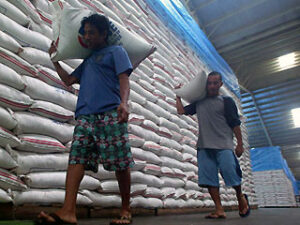Menu
House Approves Amendments to Rice Tariffication Law to Strengthen National Food Authority
- Junnel G
- May 22, 2024
- 8:11 pm
- No Comments
A Move Towards Enhanced Food Security and Price Stability
In a decisive move aimed at addressing the nation’s rice supply and price stability issues, the House of Representatives has approved amendments to the Rice Tariffication Law. This legislative change aims to restore some critical functions of the National Food Authority (NFA), which were previously stripped under the 2019 law.
Restoring NFA’s Functions
House Bill No. 10381, which was passed on third and final reading with 231 votes in favor, three against, and one abstention, seeks to reinstate the NFA’s authority in price stabilization and supply regulation. The bill emphasizes that the NFA will leverage its nationwide network and established expertise to uphold national interests, particularly in rice buffer stocking and food security.
Empowering the Agriculture Secretary
A significant provision of the bill authorizes the Agriculture Secretary, upon the recommendation of either the National Price Coordinating Council or the Local Price Coordinating Council, to declare a food security emergency. This can be triggered by specific conditions such as a shortage in rice supply, sustained increases in rice prices, or extraordinary price hikes.
Regulating Foreign Investment
The proposed amendments also grant the NFA the power to regulate foreign investments in the rice and corn industry. This move is aimed at safeguarding local farmers and consumers from potential market disruptions caused by foreign entities.
Concerns Over NFA’s Past Performance
Not all lawmakers are convinced about restoring the NFA’s functions. Camarines Sur 3rd district Rep. Gabriel Bordado Jr. abstained from voting, citing the NFA’s troubled history. Before the enactment of the Rice Tariffication Law of 2019, the NFA faced numerous challenges in effectively regulating the rice sector and protecting both farmers and consumers. Allegations of anomalous dealings and the suspension of several NFA officials over irregular sales of rice buffer stocks have cast a shadow over its reputation.
Opposition from the Makabayan Bloc
Deputy Minority Leader and ACT Teachers Rep. France Castro criticized the Rice Tariffication Law, asserting that it favors importers and foreign interests over Filipino farmers and consumers. She argued that the law perpetuates the Philippines’ status as a rice importer rather than an exporter, thereby failing to address the country’s agricultural issues.
Government’s Stance and Future Steps
President Ferdinand Marcos Jr. has indicated strong support for the bill, declaring it a priority to help bring down rice prices, which currently range between P50 to P60 per kilo. The original Rice Tariffication Law, signed by former President Rodrigo Duterte, was intended to reduce rice prices by allowing the unlimited entry of imported rice. However, this led to the NFA being prohibited from buying and selling rice, a role it might soon regain if the amendments are enacted.
House Deputy Majority Leader Erwin Tulfo has urged the Senate to adopt the House’s version of the bill to expedite the legislative process.
The Bigger Picture: Balancing Imports and Local Production
The proposed amendments are part of a broader strategy to balance rice imports with local production. While the initial Rice Tariffication Law aimed to lower prices through increased supply, the removal of NFA’s regulatory functions led to criticisms about its impact on local farmers and food security. By restoring some of these functions, the government aims to create a more stable and secure rice market, ensuring that local producers are protected while maintaining affordability for consumers.
Conclusion: A Step Towards Agricultural Reform
The approval of these amendments marks a significant step towards addressing the complex challenges in the Philippines’ rice sector. By reinstating critical functions to the NFA and empowering the Agriculture Secretary to declare food security emergencies, the government is taking proactive measures to stabilize rice prices and secure the nation’s food supply. As the Senate reviews the bill, the focus remains on achieving a balanced approach that supports both local agriculture and consumer needs.
#Top Tags COVID Covid-19 Technology Finance Investing Sustainability Economy

Subscribe to Our Newsletter and get a free pdf:





















No comment yet, add your voice below!